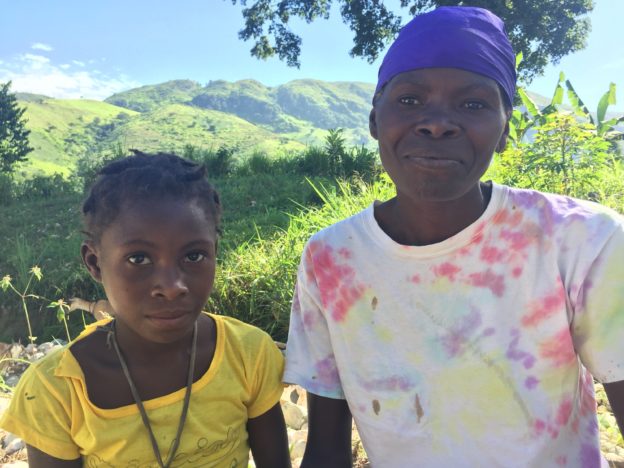Louisimène is pretty frustrated with her progress to date. She now has three goats, rather than the two we started her with, but her pig died, and she hasn’t yet been able to collect anything from the people who bought the carcass.
Rural Haitians typically sell dead or dying animals to local butchers unless the cause of death is something known or thought to make the meat harmful to consume. Or the cut the animal up themselves and sell portions to their neighbors. But these sales are made on credit. Whether the animal is purchased as a whole by a butcher or in pieces by individual consumers, the transaction usually includes a payment date, which can be months away. CLM members can have a difficult time collecting these debts. Their lack of status in their communities make them easy to fail to pay, especially since their neighbors are often jealous of the benefits they receive, especially of their livestock. Case managers or members of the village assistance committee often help them by arranging for fellow CLM members to buy the meat in small lots and then sharing responsibility for collections, but though these arrangements help ensure that a member gets paid eventually, they make it harder for the CLM member herself to feel empowered to collect what’s owed her. Louisimène feels that she herself can’t collect, that her case manager will have to do this for her.
But her real source of frustration comes from the failure of one of her harvests. Farming is the activity she really believes in. “Tout sa pou fè w miyò se yon gode pwa w plante.” That means, “It’s the cup of beans you plant that can make your life better.”
She had taken 1000 gourds – or, about $16 – of her savings to start a small commerce, but it wasn’t working. She couldn’t keep from selling on credit, and couldn’t get people to pay what they owed. “When I saw that people were just carrying off the money in my business, I decided to use it to buy beans instead.” But she planted them too late. Farmers in her area who planted in March got all the rain they needed, and are seeing a strong harvest, but she planted more than a month later, and her beans are a total loss. “Life’s treating us badly. I look at what I planted and it’s all lost.
The curious thing about this is that it is not really all lost. I know from a case manager that she also planted beans in March in one of her fields and that, like her neighbors, she looks to have a strong harvest from that field. But Louisimène is so focused on her failure that she doesn’t even think about her success. That’s something for her case manager to talk with her about.
The one part of her life that she’s happy about these days is her home. She’s finished repairing it, and feels great about that. “I still want to add a door between that two rooms, but the doors to the outside are up. We don’t get wet in the rain anymore.”
